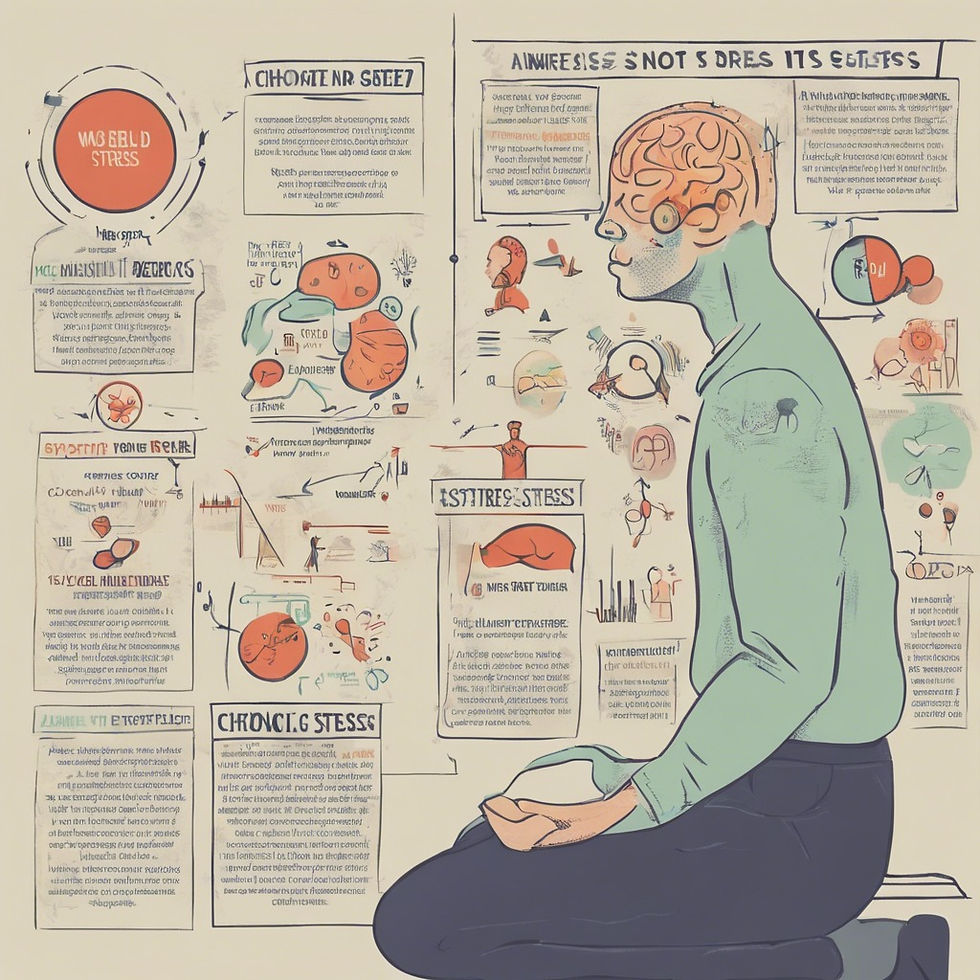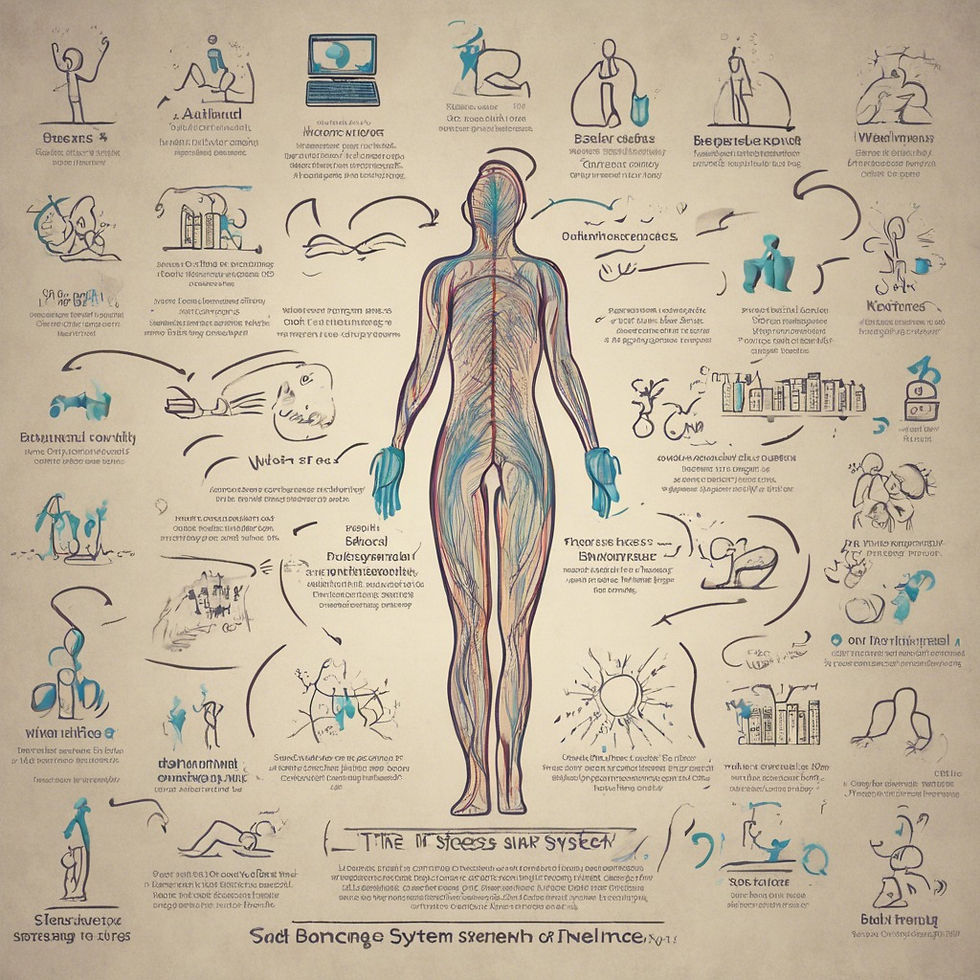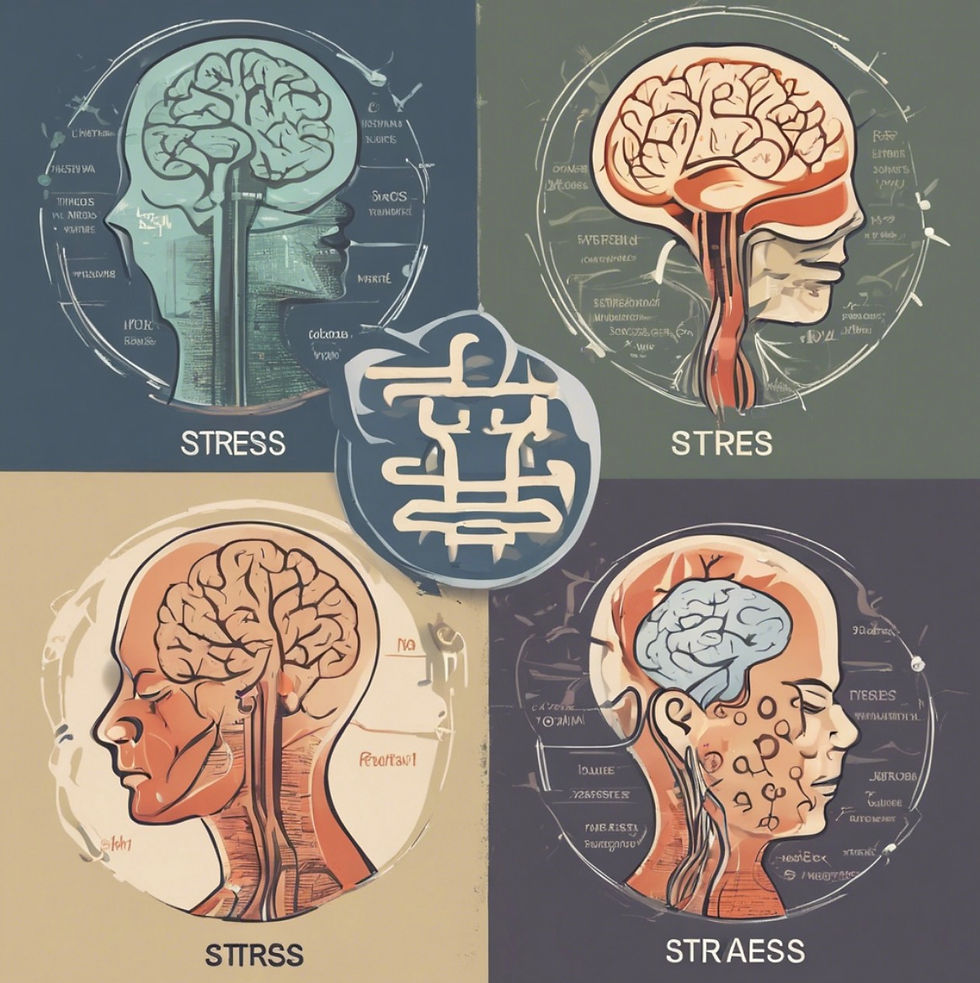The Stress- & Burnout Survival Guide
CHAPTER 1
What is Stress and is it always bad?

Is stress your enemy?
Stress is everywhere.
We feel it at work, we feel it at home, we experience it at the supermarket or in our cars or even on a night out.
It is as if it has become a constant companion for most of us. One that bothers us and gets in the way of us being happy.
But why is that? Was it always like this? Have we become unable to 'destress'?
Find out more about what stress is, its role in our evolution and immunity and what you can do about it.
Stress as evolutionary mechanism to protect You
We tend to think of stress as something that is only negative and harmful.
While stress can clearly be bad for us, it does not always have to be negative.
From an evolutionary standpoint, stress is something that is meant to help us survive. It preserves our safety and triggers a positive immune reaction in our body. It is a response of our entire nervous system to potential dangers in our environment.
Based on this, I offer you this definition of stress:
'Stress is a natural human response of our nervous system (our entire being) that helps us to manage perceived challenges and threats in our life.
Stress helps us to learn, survive and increases our physical and immune defences.'
Acute vs chronic stress
It is important to differentiate between short periods of stress, which we call acute stress, and something that is more long term and repeated, which we call chronic stress.
As mentioned earlier, acute stress can be helpful. It can even trigger a positive immune response.
However, we were not designed for repeated and constant stress. Our modern society puts an incredible amount of pressure on us.
Our Western traditional lifestyle is one that is constantly 'switched on', distracted and under strong pressures from various sources. Our nervous system is built in the same way than it was 40,000 years ago. Back then, it was useful to run away from a primal danger, to feel stress in that moment.
Today, danger is everywhere. It is constant. It is no longer primal, except in some unfortunate circumstances, but that does not matter for our nervous system. The stress response is still activated. Over and over. A not-very-nice email, working long hours, a lack of meaning at work, a mean colleague, picking up the kids on time, a car that breaks down or a subway train that does not run, trying to work while taking care of the children, paying all these bills, a war next door...the list of modern 'dangers' goes on and on. If our ability to meet our daily challenges is too low, real, dangerous stress occurs.
In the words of Gabor Maté:
‘Stress occurs when the demands made on an organism exceed that organism’s reasonable capacities to fulfil them’
You can also watch my video on chronic stress on youtube.

Stay informed! Get my newsletter
Subscribe to receive my newsletter (bi-weekly)
on positive thinking, resilience, stress and burnout
Resilience
We tend to think of resilience as the ability to 'bounce back' or to 'withstand' stress.
And while both of these definitions can be correct, I would like to give you with another one.
Constantly experiencing stress impacts the nervous system greatly. And it creates strong changes in the body.
It impacts our ability to recover and to return to our natural 'baseline', the state in which we can face challenges.
Over time, our nervous system becomes unable to find homeostasis and to regain balance and equilibrium.
Therefore, my first definition of resilience is:
‘The ability of the nervous system to find homeostasis.’
It is important to know that each person reacts differently to stress and that each person has their own 'baseline' and their own zone of stress tolerance. What may be stressful for one person might not be for another.
There is another way to look at resilience. We are the product of our 'programming' and mindset: our beliefs, our thought patterns, our traumas, our history.
While these are useful to us, they are usually also the cause of our chronic stress or burnout. But most of us do not want to question our mindset. It is hard work and painful.
And yet, it is necessary.
I would like to share with you my other definition of resilience:
'The ability to see clearly our programming and mindset and to have the psychological flexibility to learn from them.'
The four types of stress
The four types are:
-
structural stress
-
mental and emotional stress
-
biological and chemical stress
-
spiritual stress
First, structural stress. If you broke your leg for example or if you have a problem with your spine and your posture or if there's something wrong with your bones or your vertebrae, that is structural stress. This type of stress is best handled by a therapist who can take a look at it or by doctors (if you broke something). This is a very specific type of stress. But it is a form of stress nonetheless. It's stress on your body which impacts your mental and emotional state.
The second type of stress is biological and chemical. If you're having a problem at the cellular level, if you have cancer, if you've been exposed to toxins, if you have a viruse or bacteria, this is a biological or chemical type of stress. There's something going on at the cellular level or at the DNA level and it is stressing you. This can create a huge amount of stress on your body which then leads to overall stress and to consequences for your mental health. It is important to realize that any kind of stress on the body is stress overall. Stress does not only come from things that are affecting emotionally or cognitively. If your body is stressed by an illness or an infection, or a lack of a vitamins, or by a bad bacteria in your intestine, it will create an overall stress reaction.
The third type of stress is mental and emotional. When we think of stress, we often think of that kind of stress. Mental or emotional stress can come from a lot of different places. It can come from trauma when you were young or it can come from an inability to feel positive. Perhaps you have some kind of disregulation in your body with your hormones or your neurotransmitters. This is biological and chemical stress but then also connects to mental and emotional stress. You could also have mental or emotional stress because your relationship broke down, you lost a parent, you lost your job or because there's a lot of restructuring and new stuff going on at work, or because somebody yelled at you and did not treat you right. These are all forms of mental and emotional stress.
The last type of stress is what we call spiritual stress. Here we are referring to the bigger questions in life, such as purpose, search for meaning, search for identity...Very often people will come to a point in their life - and I've been through this myself - where you ask yourself 'who am I?', 'what is the new version of me?'. Especially if you're somebody who's prone to stress, you are probably somebody who's prone to asking yourself these questions, or at least coming to a point where these questions are going to become relevant. 'Do I have a relationship to some kind of higher level (whatever that may mean for you)? It doesn't have to be traditional religion. It could be something else such as purpose, meaning, or a sense of belonging. Do I feel fulfilled in this area? If not, then I'm probably experiencing constant stress.
Symptoms and impact of chronic stress
Some of the symptoms of Chronic Stress are:
-
Structural changes in the brain
-
Changes in hormones and neurotransmitters (cortisol,serotonin, adrenaline, dopamine, sex hormones...)
-
Chronic pain and fatigue
-
Insomnia
-
Increased anxiety and depression
-
Decreased absorption (vitamins, minerals...)
-
Decreased digestive function (less enzyme and bile production,less gastrointestinal blood flow, less motility...), less gut floradiversity with higher risk of dysbiosis, SIBO and Leaky Gut
-
Decrease in thermic efficiency and regulation
-
Increased risk for high cholesterol and diabetes, heart disease, stroke, high blood pressure
It is important to note that, while some of these are also present in a Burnout, a state of chronic stress tends to be associated with some kind of ability to still function. Thus, many body functions are still activated to make it possible for the person to still engage in certain activities.
Chronic stress is connected to hyper or over-activation (fight or flight), while Burnout is connected with hypo or under-activation (freeze and shutdown).
Your nervous system and neuroplasticity
Our nervous system is a highly complex network of signalling nerves and fibres running through the entire brain and body. As explained already, stress is a reaction of your nervous system, which includes your brain. Let's explore this wonderful creation:
-
7 trillion nerves in the body
-
Nerve impulses can travel at a speed of up to 100 meters per second
-
More than 100 neuro-transmitting substances have been implicated in signal transmission between nerves
-
Our brains are about 5 to 7 times larger than would be expected for a mammal of our body size
-
Our brains are just 2% of our body weight but use 20% of its energy
-
It burns oxygen and glucose at about 10 times the rate of our muscles per unit
-
Our brain has 86 billion neurons, each with 10,000 connections to one another for a total of connection in the hundreds of trillions
-
We have 500 million neurons in our gut
-
We have 40,000 neurons in our heart
Neuroplasticity shows that we can change the structure and function of our brain through our experiences, beliefs and thoughts. The same applies to our entire nervous system.
-
Our nervous system is not hardware. It is flexible and adaptable software that works with whatever you plug in: a belief, an experience, a habit, a thought pattern
-
It allocates space to what you ‘plug in’. Remove it and that space slowly disappears ’
-
The plasticity of our nervous system gives us the freedom to choose who we want to be and to decide how we react to stress
-
Thinking negative or anxious thoughts over and over will teach your nervous system to react more easily and to go towards more negative and anxious thoughts
-
And reframing your relationship to the negative and thinking positive thoughts will teach your nervous system to prioritise the positive over the negative
-
Chronic stress means that we have trained our nervous system in one clear direction for a long period of time. The direction of stress, anxiety, and negative thought patterns and emotions
-
Change your patterns and mindset, and you change your stress response







